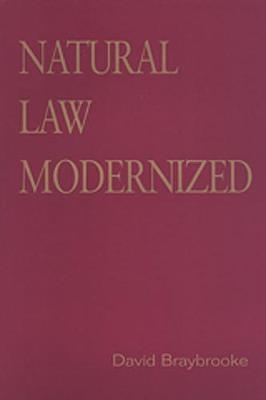
Natural Law Modernized
Seiten
2003
University of Toronto Press (Verlag)
978-0-8020-8644-0 (ISBN)
University of Toronto Press (Verlag)
978-0-8020-8644-0 (ISBN)
- Titel z.Zt. nicht lieferbar
- Versandkostenfrei innerhalb Deutschlands
- Auch auf Rechnung
- Verfügbarkeit in der Filiale vor Ort prüfen
- Artikel merken
Braybrooke challenges received scholarly opinion by arguing that canonical theorists Hobbes, Locke, Hume, and Rousseau took St Thomas Aquinas as their point of reference, reinforcing rather than departing from his natural law theory.
Hobbes, Locke, Hume, and Rousseau are classic modern philosophers, widely consulted in matters of ethics and political theory. In this provocative study David Braybrooke challenges received scholarly opinion by arguing that these canonical theorists took St Thomas Aquinas as their point of reference, reinforcing rather than departing from his natural law theory.
The natural law theory of St Thomas Aquinas is essentially a secular theory, says Braybrooke. He argues that Hobbes, Locke, Hume, and Rousseau share a core of thought that not only has roots in St Thomas but offers an alternative to other ethical theories now current. According to Braybrooke, this surviving and reinforced core qualifies as an ethical theory viable by the most sophisticated standards, meeting the main challenges of analytical metaethics, and thus standing up to the scrutiny that any ethical theory must undergo in contemporary philosophical discussions.
Braybrooke's study takes the reader into a rich and compelling intellectual universe, one in which medieval natural law theory, widely ignored as obsolete, survives robustly through the modern canon and into the third millennium.
Hobbes, Locke, Hume, and Rousseau are classic modern philosophers, widely consulted in matters of ethics and political theory. In this provocative study David Braybrooke challenges received scholarly opinion by arguing that these canonical theorists took St Thomas Aquinas as their point of reference, reinforcing rather than departing from his natural law theory.
The natural law theory of St Thomas Aquinas is essentially a secular theory, says Braybrooke. He argues that Hobbes, Locke, Hume, and Rousseau share a core of thought that not only has roots in St Thomas but offers an alternative to other ethical theories now current. According to Braybrooke, this surviving and reinforced core qualifies as an ethical theory viable by the most sophisticated standards, meeting the main challenges of analytical metaethics, and thus standing up to the scrutiny that any ethical theory must undergo in contemporary philosophical discussions.
Braybrooke's study takes the reader into a rich and compelling intellectual universe, one in which medieval natural law theory, widely ignored as obsolete, survives robustly through the modern canon and into the third millennium.
David Braybrooke was a professor emeritus in the Department of Philosophy at Dalhousie University and holds the Centennial Commission Chair in the Liberal Arts at the University of Texas at Austin.
| Erscheint lt. Verlag | 3.7.2003 |
|---|---|
| Reihe/Serie | Toronto Studies in Philosophy |
| Verlagsort | Toronto |
| Sprache | englisch |
| Maße | 153 x 229 mm |
| Gewicht | 556 g |
| Themenwelt | Geisteswissenschaften ► Philosophie ► Ethik |
| Geisteswissenschaften ► Philosophie ► Geschichte der Philosophie | |
| Geisteswissenschaften ► Philosophie ► Philosophie des Mittelalters | |
| Geisteswissenschaften ► Philosophie ► Philosophie der Neuzeit | |
| ISBN-10 | 0-8020-8644-6 / 0802086446 |
| ISBN-13 | 978-0-8020-8644-0 / 9780802086440 |
| Zustand | Neuware |
| Haben Sie eine Frage zum Produkt? |
Mehr entdecken
aus dem Bereich
aus dem Bereich
unsere kollektive Verantwortung
Buch | Hardcover (2023)
wbg Theiss in Wissenschaftliche Buchgesellschaft (WBG) (Verlag)
35,00 €


